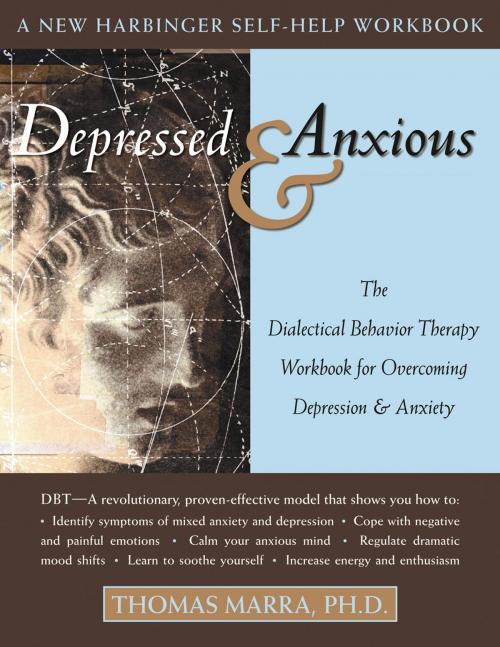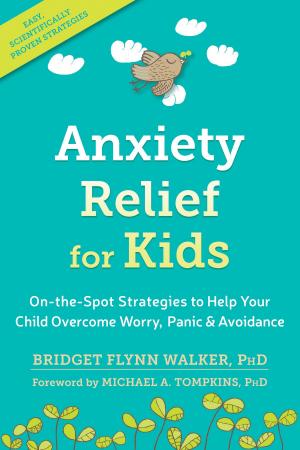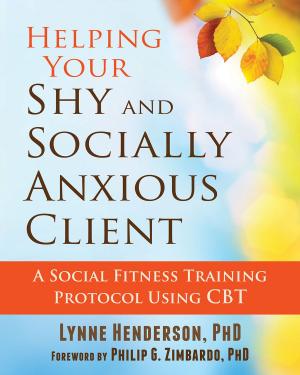Depressed and Anxious
The Dialectical Behavior Therapy Workbook for Overcoming Depression and Anxiety
Nonfiction, Health & Well Being, Self Help, Mental Health, Depression| Author: | Thomas Marra, PhD | ISBN: | 9781608824205 |
| Publisher: | New Harbinger Publications | Publication: | May 1, 2004 |
| Imprint: | New Harbinger Publications | Language: | English |
| Author: | Thomas Marra, PhD |
| ISBN: | 9781608824205 |
| Publisher: | New Harbinger Publications |
| Publication: | May 1, 2004 |
| Imprint: | New Harbinger Publications |
| Language: | English |
As if coping with feelings of depression or anxiety by themselves weren’t difficult enough, clinical research suggests that as many as 60 percent of depression sufferers concurrently experience some kind of anxiety disorder. If you are in this group, it is quite common to simultaneously experience profound loss of energy and initiative along with substantial stress and anxiety. Caught between the push and pull of these two conditions, you might find that neither is easy even to recognize, much less cope with. But, by adapting for the first time the powerful techniques of dialectical behavior therapy, or DBT, to the special needs of people troubled by co-occurring depression and anxiety, this book offers powerful tools for overcoming this condition. DBT is designed for people who have lost hope and meaningfulness in life, who question their own ability to be influential in their world, who find their emotions intolerable, and who find that they try to escape and avoid important aspects of their lives. DBT may be just the tool you’ve been looking for to move beyond depression and anxiety.
The step-by-step exercises, techniques, and worksheets in this book work to identify painful inner conflicts that might underlie depression and anxiety symptoms. Then, by negotiating a series of compromises, the techniques help acknowledge these issues while limiting their ability to interfere with your life—effectively reducing the extent to which your emotions govern who you are or what you are capable of. This book explains mindfulness techniques that encourage participation in the world and allow easier adaptation to change. It treats the difference between “threat cues” and “safety cues” and how recognizing and reacting to them constructively can reduce the effects of anxiety and depression. By teaching you how to monitor and limit negative self-evaluations and how to best tolerate negative experience, this book gives you a powerful set of tools for the control of co-occurring depression and anxiety.
As if coping with feelings of depression or anxiety by themselves weren’t difficult enough, clinical research suggests that as many as 60 percent of depression sufferers concurrently experience some kind of anxiety disorder. If you are in this group, it is quite common to simultaneously experience profound loss of energy and initiative along with substantial stress and anxiety. Caught between the push and pull of these two conditions, you might find that neither is easy even to recognize, much less cope with. But, by adapting for the first time the powerful techniques of dialectical behavior therapy, or DBT, to the special needs of people troubled by co-occurring depression and anxiety, this book offers powerful tools for overcoming this condition. DBT is designed for people who have lost hope and meaningfulness in life, who question their own ability to be influential in their world, who find their emotions intolerable, and who find that they try to escape and avoid important aspects of their lives. DBT may be just the tool you’ve been looking for to move beyond depression and anxiety.
The step-by-step exercises, techniques, and worksheets in this book work to identify painful inner conflicts that might underlie depression and anxiety symptoms. Then, by negotiating a series of compromises, the techniques help acknowledge these issues while limiting their ability to interfere with your life—effectively reducing the extent to which your emotions govern who you are or what you are capable of. This book explains mindfulness techniques that encourage participation in the world and allow easier adaptation to change. It treats the difference between “threat cues” and “safety cues” and how recognizing and reacting to them constructively can reduce the effects of anxiety and depression. By teaching you how to monitor and limit negative self-evaluations and how to best tolerate negative experience, this book gives you a powerful set of tools for the control of co-occurring depression and anxiety.















